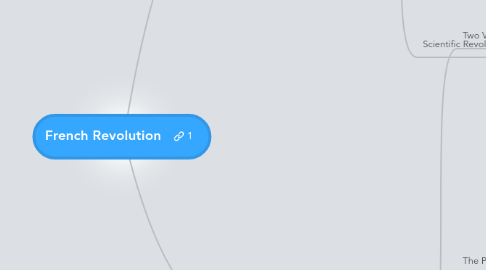
1. 20.1 Scientific Revolition
1.1. Roots of Modern Science
1.1.1. Medieval View
1.1.1.1. Earth was an unmoving object
1.1.1.1.1. Moon, sun, and planets moved in perfect circles around the earth.
1.1.2. A New Way of Thinking
1.1.2.1. The Scientific revloution was a new way of thinking about the natural world.
1.1.2.1.1. During the Renaissance scholars uncovered many classical manuscripts.
1.2. A Revolutionary Model of the Universe
1.2.1. The Heliocentric Theory
1.2.1.1. Geocentric theory did not accurately explain the moevment of the sun moon and plants.
1.2.1.1.1. Heliocentric - sun-centered theory, did not completely explain the planets orbited the way they did.
1.2.2. Galileo's Discoveries
1.2.2.1. Galileo found that a falling object accelerates at a fixed and predictible rate
1.2.2.1.1. Also tested areostotles theory that heavy objects fall faster then light ones
1.2.3. Conflict with the Church
1.2.3.1. Galileo's findings frightened both catholics and protestants, as his findings went against all church teachings.
1.2.3.1.1. in 1632 Galileo published "Dialouge Concerning The Two Chief World Systems"
1.3. The Scientific Method
1.3.1. logical procedure for testing ideas.
1.3.2. Francis Bacon
1.3.2.1. The Man the Myth The Douche
1.4. Newton Explains the Law of Gravity
1.4.1. Newton Studied math and physics at Cambridge
1.5. Scientific Revolution Spreads
1.5.1. Scientific Insturments
1.5.1.1. scientists invented new tools and insturments to make the precise observations that the scientific method demanded.
1.5.1.1.1. in 1643 Evangelista Torricelli invented the first mercury barometer.
1.5.2. Medicine and the Human Body
1.5.2.1. Galen (greek physician) never disected body of a human being
1.5.2.1.1. He instead studied anatomy of pigs and other animals.
1.5.3. Discoveries in Chemistry
1.5.3.1. Robert Boyle pioneered the use of Scientific method in chemistry
1.5.3.1.1. in 1774 Joseph Priestley seperated 1 pure gas from air.
2. 22.2 The Enlightenment in Europe
2.1. Two Views on Government
2.1.1. Hobbes's Social Contract
2.1.1.1. Leivthian published in 1651 expressed his views
2.1.2. Locke's Natural Rights
2.1.2.1. Locke criticized absolute monarchy and favored the idea of self-government.
2.2. The Philosophes Advocate Reason
2.2.1. Philosophes
2.2.1.1. Reason
2.2.1.2. Nature
2.2.1.3. Happiness
2.2.1.4. Progress
2.2.1.5. Liberty
2.2.2. Voltaire Combats Intolerance
2.2.2.1. Francois Marie Arouet - was most brilliant and influential of the philosophes
2.2.3. Montesquieu and the Seperation of Powers
2.2.3.1. Baron de Montesquieu (french Writer) devoted himself to study political liberty.
2.2.4. Rosseau: Champion of Freedom
2.2.4.1. Jean Jacques Rosseau - passionately committed to individual freedom
2.2.5. Beccaria Promotes Criminal Justice
2.2.5.1. Believed that laws existed to preserve social order not to avenge crimes
2.3. Women and the Enlightenment
2.3.1. Women Writers tried improving status of women
2.3.1.1. Some male writers argued for more education for women and for womens equality in marriage
2.4. Impact of the Enlightenment
2.4.1. Belief in Progress
2.4.1.1. Scientists made key new discorveries in chemistry, physics, biology, and mechanics
2.4.2. A more Secular Outlook
2.4.2.1. people began to openly question religious beliefs and the teachings of the church.
2.4.3. Importance of individual
2.4.3.1. the philosophes encouraged people to use their own ability to reason and order to judge what is right or wrong
